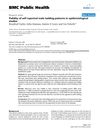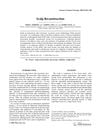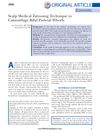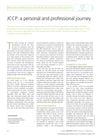 7 citations,
January 2018 in “International Journal of Trichology”
7 citations,
January 2018 in “International Journal of Trichology” Wearing a wig caused a skin condition to develop in a woman with hair loss.
 August 2024 in “Journal of Cosmetic Dermatology”
August 2024 in “Journal of Cosmetic Dermatology” Injectable treatments can effectively and safely improve hair growth in adults with androgenetic alopecia.
 8 citations,
July 2021 in “Patient Preference and Adherence”
8 citations,
July 2021 in “Patient Preference and Adherence” Alopecia treatments improve life quality but side effects can lessen this benefit; better use of quality of life measures is needed.
 1 citations,
May 2021 in “BMC Proceedings”
1 citations,
May 2021 in “BMC Proceedings” The document concludes that more research is needed to reduce frequent hospital visits, addiction medicine education improves with specific training, early breast cancer surgery findings are emerging, nipple smears are not very accurate, surgery for older melanoma patients doesn't extend life, a genetic condition in infants can often be treated with one drug, doctors are inconsistent with blood clot medication, a certain gene may protect against cell damage, muscle gene overexpression affects many other genes, and some mitochondrial genes are less active in mice with tumors.
 October 2024 in “A I Burnasyan Federal Medical Biophysical Center Clinical Bulletin”
October 2024 in “A I Burnasyan Federal Medical Biophysical Center Clinical Bulletin” Various treatments effectively manage androgenetic alopecia.
 11 citations,
April 2023 in “BioMed Research International”
11 citations,
April 2023 in “BioMed Research International” Microbial biosurfactants could be a safer and environmentally friendly alternative to chemical surfactants in cosmetics.
 July 2024 in “Gene & Protein in Disease”
July 2024 in “Gene & Protein in Disease” Exosome therapy shows promise for treating skin conditions and improving wound healing.
 June 2024 in “Skin Health and Disease”
June 2024 in “Skin Health and Disease” Men with alopecia often feel less confident and have lower wellbeing, needing more support.
 32 citations,
December 2004 in “BMC Public Health”
32 citations,
December 2004 in “BMC Public Health” Men can report their own balding patterns well enough for large health studies.
 165 citations,
September 2011 in “Journal of Public Policy & Marketing”
165 citations,
September 2011 in “Journal of Public Policy & Marketing” People who are more materialistic often expect life changes from buying things, leading to more debt and credit misuse.
 66 citations,
October 2006 in “Journal of Surgical Oncology”
66 citations,
October 2006 in “Journal of Surgical Oncology” Different scalp reconstruction methods work well, but the best one depends on the patient's unique needs.
 3 citations,
December 2003 in “University of California Press eBooks”
3 citations,
December 2003 in “University of California Press eBooks” Media images promote unrealistic beauty standards, affecting body image and eating disorders globally.
 37 citations,
January 2010 in “Internal Medicine”
37 citations,
January 2010 in “Internal Medicine” A woman's liver was damaged by taking the herbal supplement Shou-Wu-Pian, but it got better after she stopped using it.
 25 citations,
June 2013 in “Obesity Reviews”
25 citations,
June 2013 in “Obesity Reviews” Mesotherapy might help reduce fat in specific areas for those close to their ideal weight, but more research and care are needed to ensure safety.
 4 citations,
April 2016 in “Plastic and reconstructive surgery. Global open”
4 citations,
April 2016 in “Plastic and reconstructive surgery. Global open” Scalp medical tattooing effectively camouflages bifid parietal whorls.
 3 citations,
March 2000 in “The American Journal of Cosmetic Surgery”
3 citations,
March 2000 in “The American Journal of Cosmetic Surgery” A surgeon is defined by their ability to operate, not just formal training, and dermatologists can safely perform cosmetic surgeries.
 April 2016 in “Journal of Aesthetic Nursing”
April 2016 in “Journal of Aesthetic Nursing” The letter concludes that the aesthetics sector needs better regulation and higher-level training to ensure patient safety.
 108 citations,
November 2006 in “The Milbank Quarterly”
108 citations,
November 2006 in “The Milbank Quarterly” Drug advertising has greatly increased, changing consumer behavior and raising concerns about its influence on healthcare and patient protection.
 20 citations,
August 2016 in “International Journal of Cancer”
20 citations,
August 2016 in “International Journal of Cancer” Men with male pattern baldness have a higher risk of certain skin cancers, especially on the scalp.
 15 citations,
December 2019 in “Aesthetic Surgery Journal”
15 citations,
December 2019 in “Aesthetic Surgery Journal” Most insurance companies do not cover extra gender-affirming surgeries, with coverage being low and inconsistent.
 1 citations,
April 2021 in “Clinical and Experimental Dermatology”
1 citations,
April 2021 in “Clinical and Experimental Dermatology” The COVID-19 pandemic has caused a 57% increase in interest in facial cosmetic procedures, leading to calls for better industry regulation and professional standards.
 1 citations,
March 2016 in “Current Dermatology Reports”
1 citations,
March 2016 in “Current Dermatology Reports” New evaluation tools are needed for better surgical training in dermatology residency programs.
 1 citations,
February 2004
1 citations,
February 2004 Skin diseases are common and can significantly affect people's lives; better outcome measures and ethical clinical trials are needed to improve dermatology care.
 June 2019 in “Journal of Aesthetic Nursing”
June 2019 in “Journal of Aesthetic Nursing” The author now supports the JCCP's efforts to improve non-surgical aesthetic practices after initial skepticism.
 May 2019 in “Journal of Cosmetic Dermatology”
May 2019 in “Journal of Cosmetic Dermatology” ABHRS surgeons got higher ratings on Healthgrades and lower on Yelp compared to nonsurgeons, with training affecting satisfaction differently across platforms.
 December 2017 in “Journal of Aesthetic Nursing”
December 2017 in “Journal of Aesthetic Nursing” Level 7 qualifications for aesthetic procedures like botox and fillers are not mandatory, but they can improve skills and credibility.
 January 1983 in “Journal of the American Oil Chemists' Society”
January 1983 in “Journal of the American Oil Chemists' Society” The U.S. soybean industry wanted government help due to foreign competition, while the jojoba industry was growing and expected to stabilize.
 244 citations,
September 2008 in “Annual Review of Genomics and Human Genetics”
244 citations,
September 2008 in “Annual Review of Genomics and Human Genetics” The document concludes that the fast-growing direct-to-consumer genetic testing market lacks sufficient regulation, posing risks to consumers due to questionable test quality and accuracy.
 62 citations,
September 1974 in “Academy of Management Journal”
62 citations,
September 1974 in “Academy of Management Journal” Karl E. Weick suggested focusing on everyday events and smaller groups to improve organizational theory and urged the inclusion of nonobvious aspects for better explanations.
 58 citations,
July 2007 in “Clinics in Dermatology”
58 citations,
July 2007 in “Clinics in Dermatology” Tattooing helps treat skin conditions, reconstruct nipple-areola, mark radiation fields, and locate lesions.






























